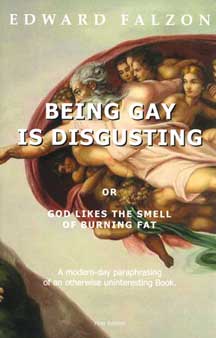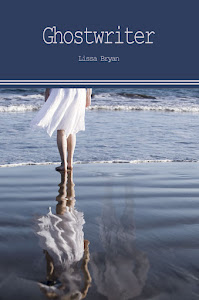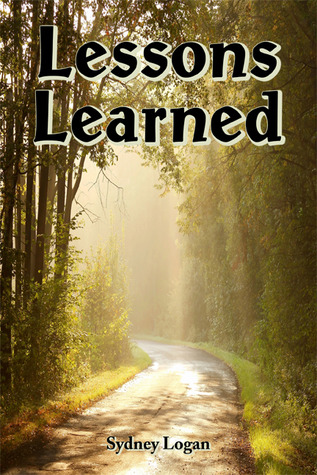The following interview was originally printed in Freethinker magazine, and has been kindly permitted to be reproduced here.
——————-
The Christian right are always quick to cite the Bible when opposing gay marriage, claiming their bigotry is a reflection of God’s will. But how well do they actually know their “holy” book? Are they aware that the same book also advocates human sacrifices or that, as well as condemning homosexuals, it bans cross-breeding animals and wearing clothes made from multiple types of thread?
In Being Gay is Disgusting, Edward Falzon argues that religious fundamentalists are cherry picking which parts of the Bible they follow to suit their own prejudices. He points out that the god of the Bible displays a moral code that is at odds with that of most modern day Christians and draws attention to the parts of the so-called “good book” that nobody who isn’t a complete psychopath could possibly follow. Being Gay is Disgusting lays the Bible bare and pokes fun at some of its less ethically commandments. I caught up with Edward to find out the inside story of this controversial yet highly necessary book.
RS: What inspired you to write Being Gay is Disgusting?
EF: Many years ago, I became curious about the contents of the biblical books – not from a spiritual “I’m looking for answers” perspective but rather an intellectual curiosity. I began to read a Bible and immediately fell asleep. I had discovered why even Christian websites admit that over 90 percent of Christians haven’t read it; it’s long, it’s boring and it’s repetitive. Incidentally, I never use a capital for “bible” any more. It’s not like there’s only one of them; there are countless translations, leaning towards whatever ideology the translators desire, so “bible” has very much become a noun.
RS: Your book sheds light on disturbing parts of the Bible that most Christians probably don’t know exist. Do you think that Christianity’s popularity is partly down to its followers’ lack of familiarity with the book?
EF: Absolutely. In fact during the “Biblical Morality Tour” that I’m doing now, I’ve spoken several times on the subject of Christians not following their own bibles. Not only that, but they wouldn’t follow some biblical directives if Jesus himself were standing next to them holding a crucifix to their heads. They think they’re following the bible in their morality and lifestyle but they simply aren’t. That’s what I try to discuss with Christians and I want to encourage them not to follow [the] Bible any more than they are now.
RS: Can you say a little bit about the tour that you’re doing?
EF: I’m presently travelling throughout North America giving speeches, primarily on biblical morality. I’d prefer debates but ministers and theologians are yet to step up and share the stage.
The Secular Student Alliance has been very supportive, with several student groups booking me to speak on campus. Many groups connected to the Center For Inquiry have also invited me to speak. It has been great meeting so many atheist and secular people who are as concerned for civilisation as I am.
My expat friends in Shanghai, where I’ve lived for four years, aren’t really aware of the constant and seemingly accelerating encroachment of religion into politics, education and law. I want to do my part to stop that, and so I’m on tour, speaking to anyone who wants to listen.
RS: As well as being informative and insightful, your book is also laugh out loud funny in places. How important a tool do you think humour is in the fight against hateful religions such as Christianity?
EF: I think humour is crucial. It’s perfectly okay to ridicule the ridiculous. People have been misled – not since the last election, not even their whole lives, but for literally millennia. They don’t realise it, so taking what they have perceived to be solemn and true all their lives and delivering it as an insightful punch line has the effect of helping them to see how silly these notions are. In some cases, it can even snap someone out of religion entirely.
RS: Have you received much opposition to the book from Christians/religious types?
EF: The only opposition I’ve encountered so far is people saying that Being Gay is Disgusting only covers the Old Testament, which Christians say isn’t as relevant as the New Testament.
Of course Original Sin, from which Jesus is said to have come to absolve us, all the commandments, which Jesus is said to have come to uphold, and the prophecies of Jesus’ coming, which Jesus is said to have fulfilled, are all in the Old Testament. No one would have been on the lookout for Jesus if the Old Testament didn’t exist.
The OT also accounts for 80 per cent of the content and ninety-five per cent of the timeline of any Bible, so to disregard it is to disregard most of one’s owner’s manual. Other than that, there has been a small amount of opposition on “moral” grounds, but for the most part, even Christians have been positive about this book, acknowledging that it’s okay to laugh at the silly parts of the Bible.
RS: What would you say is the most disturbing part of the Bible that you discovered whilst writing your book?
EF: It’s hard to pick just one, since it seems that any minor transgression comes with a death penalty, which is pretty damn disturbing. Of course, above that would be the transgressions that were not specified as wrong but which resulted in death anyway.
Lot’s wife comes to mind. All the angel said was “run for the hills and don’t look back.” Apparently he meant that literally because when the missus looked back, she was killed by being turned into a pillar of salt.
But I think the most disturbing story might be the one of Jephthah in Judges 11. He makes a deal with Yahweh that if he wins in the upcoming battle, he’ll sacrifice whatever first comes out of his gates to greet him when he gets home. He wins the war, heads home and his daughter come out of the gates. He’s sad but still goes ahead and sacrifices her on the altar. There’s better morality in Mein Kampf.
RS: Why do you think some Christians are so obsessed with homosexuality?
EF: Because they’re trained from the pulpit to be bigots and taught only to read the “happy” parts of the bible. They don’t realise that something as random as Yahweh liking the smell of burning fat is mentioned more often than homosexuality.
RS: How has Being Gay is Disgusting been received by the gay community?
EF: Extremely positively. I was very gratified to see reviews come in from South Florida Gay News, Out in Jersey, Out in Perth and so on. Actually I think most of my reviews have been from gay mags and every single one was extraordinarily supportive.
RS: You have previously stated that you were raised in a Catholic household. When did the turning point come where you realised that the Bible probably wasn’t true?
EF: Actually that was only once I started reading it a few years ago. As a Catholic kid, I was never given a Bible to read; I was just told that Jesus totally loves me and Hell is a bad place.
After prepping myself with multiple shots of Red Bull and Jolt Cola and sticking toothpicks in my eyelids, I began reading through it from page one. But there’s the problem; page one is just objectively wrong. It asserts that the moon is a source of light, that the sun is inside the sky of earth, above which there is water stored for rain, and that the stars are there purely to remind us of the seasons.
I also delved into archaeology to find out the accuracy of the Bible’s historical claims. It didn’t go in favour of the biblical account. Archaeologists have found less than nothing to support the biblical account, by which I mean they’ve not only found nothing in support of it but also an abundance of evidence against it. The Old Testament biblical accounts, at least in the books of Moses, are entirely, inescapably untrue.
RS: You have criticised the Bible’s effect on children, stating that growing up in a household run by religious fundamentalists can jeopardise a child’s well-being. Can you elaborate on this?
EF: Though most households, Christian or otherwise, make the safety and well-being of their kids the highest priority, many fundamentalist families have allowed their children to die rather than take them to those Satan-inspired hospitals. Mothers have drowned or even stoned their own children because they’ve sincerely believed that Yahweh and/or Jesus told them to. A quick search on CNN, BBC or Huffington Post will show story after story.
RS: Finally, do you have any more books on the cards and what can we expect from you throughout the years to come?
EF: My Biblical Morality series is a pentalogy that began with Being Gay is Disgusting. I’m now writing the fifth volume, which will be about the whole New Testament, from Matthew to Revelation. The title is Women Should Shut Up and Listen. It’ll be out just as soon as I’ve finished it. Then I’ll write the three in the middle.
Phase one of my tour covers the Pacific and Midwest states of the USA and the southwestern provinces of Canada. I’d like to get enough interest to be able to do phases two and three, which will take me to Southeast Canada, the northeast states of the USA, the southern states and the West. I’d like to be on tour until next year but this depends on how long my budget and sanity hold out.
I’ve also started blogging on the Huffington Post at www.huffingtonpost.com/edward-falzon so that’s a great place to keep up with what pisses me off in current affairs. I’m gradually developing a YouTube channel for the enjoyment and ridicule of netizens everywhere, which you can find at www.youtube.com/edwardfalzon. Naturally, I also do the whole Twitter and Facebook things so follow me at @edwardfalzon and add me at www.facebook.com/edwardfalzon.




